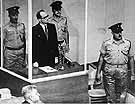
|
|
|

|

|

|

|
|
Click on an image to see a larger, more detailed picture.
|
|
|
|
|
| EPILOGUE: The Aftermath |

|
pg. 674 |

|
|
|
|
| |
 The Eichmann Trial
The Eichmann Trial
The trial of Adolf Eichmann in 1961 was a transformative event in the scholarly investigation of the Holocaust. Before the trial, the details of the Nazi genocide had seldom been evaluated systematically, and survivors were reluctant to openly reflect upon their experiences. Kidnaped by Israeli agents in Argentina in 1960, Eichmann was brought to Israel to stand trial. Not only did the trial establish Eichmann's guilt, but it also presented the details of the "Final Solution" as they unfolded in Europe from 1933 until 1945. One of the most shocking revelations that resulted from the trial was the discovery that Eichmann, a primary agent in the killing of millions of Jews, was a relatively ordinary human being. He was not a zealous Nazi, only a bureaucrat doing his job. Adolf Eichmann was executed by hanging at midnight on May 31-June 1, 1962. His body was cremated and his ashes spread over the sea, beyond the territorial waters of Israel.
Photo: Central Zionist Archives / United States Holocaust Memorial Museum Photo Archive
|
|
Goldhagen's logic entailed this relationship to mean that the majority of Germans were not only willing to let the Holocaust happen, but probably would have participated directly in the killing if called upon to do so. Confident of the superiority of his own judgment, Goldhagen contended that few puzzles remain about the Holocaust's causes. Although explaining how the Holocaust happened remains a long story, he believed that there was no need to dwell on most of the complexities that decades of causal analysis of the Holocaust has produced. As Goldhagen saw it, the Holocaust had one cause that outweighed the others. Direct and straightforward, it involved the motivation without which the Holocaust was unthinkable: namely, the Germans' antisemitic beliefs about Jews. Remove that factor and the Holocaust that actually happened would not have taken place. On the other hand, to realize the Final Solution, the antisemitism of Goldhagen's ordinary Germans did need the catalyst that Hitler and the Nazi Party provided. Nevertheless, by themselves Hitler and the Nazi Party alone could not have made the Holocaust happen as it did. The actual Holocaust required willing, ordinary Germans to bring it about. Fanatically antisemitic as they were, Goldhagen suggests, Hitler and the Nazi Party had a reciprocal relationship with ordinary Germans when it came to the "Jewish question." In Hitler and the Nazi Party, ordinary Germans got the organization, determination, and legitimation to act on their latent, if not active, will to destroy European Jewry. In ordinary Germans, Hitler and the Nazi Party found a people who were well prepared to carry out the plan for a Third Reich that would be judenrein ("cleansed of Jews"). Thus, when Goldhagen reckoned with the actuality of the Holocaust, his book became much more than an explanation of how he thought the Holocaust took place. With his view that the Germans' antisemitic motivation was the most crucial condition--necessary though not alone sufficient--for the Holocaust, Goldhagen indicted "ordinary Germans," a category as broad as it was undiscriminating, and rendered a sweeping verdict of collective German guilt. Goldhagen's book has its merits. They exist primarily in his expansion of some details about the Final Solution, but not in the book's specious promise to achieve a groundbreaking analysis that meets a need--more imagined than real--for "radical revision" of nearly all previous scholarship on the Holocaust.
|
|

|

|

|

|
 1962: The Avenue of the Righteous is inaugurated at the Yad Vashem memorial in Jerusalem, where trees are planted to honor non-Jews who helped Jews during the Holocaust.
1962: The Avenue of the Righteous is inaugurated at the Yad Vashem memorial in Jerusalem, where trees are planted to honor non-Jews who helped Jews during the Holocaust.
|
 May 1962: Adolf Eichmann's appeal of his death sentence is rejected; See May 31, 1962.
May 1962: Adolf Eichmann's appeal of his death sentence is rejected; See May 31, 1962.
|
 May 31, 1962: Adolf Eichmann is hanged in Israel.
May 31, 1962: Adolf Eichmann is hanged in Israel.
|
 December 20, 1963-August 20, 1965: The trial of 21 leading SS officers who worked at the Auschwitz extermination camp is held at Frankfurt am Main, West Germany. Verdicts range from acquittal to life.
December 20, 1963-August 20, 1965: The trial of 21 leading SS officers who worked at the Auschwitz extermination camp is held at Frankfurt am Main, West Germany. Verdicts range from acquittal to life.
|
 1964: To date, approximately 65,000 Nazi war criminals have been tried and sentenced.
1964: To date, approximately 65,000 Nazi war criminals have been tried and sentenced.
|
 1965: The Vatican acknowledges that the Catholic Church must bear some responsibility for antisemitism, and attempts to end it within the Church.
1965: The Vatican acknowledges that the Catholic Church must bear some responsibility for antisemitism, and attempts to end it within the Church.
|
|
|
|
|
| EPILOGUE: The Aftermath |

|
pg. 674 |

|
|
The Holocaust Chronicle
© 2009 Publications International, Ltd.
|
|
